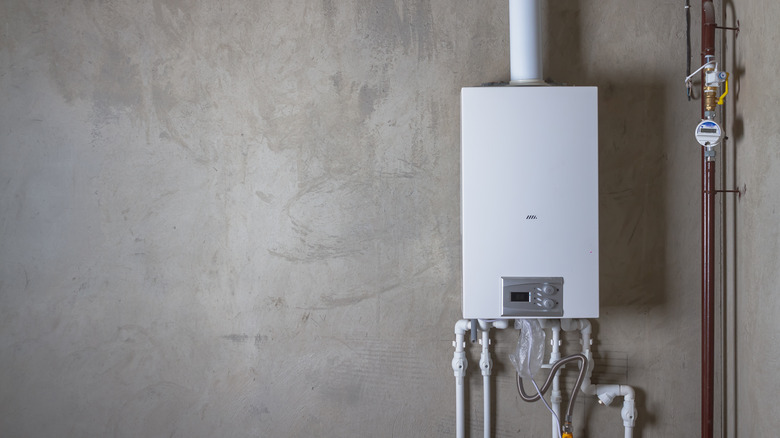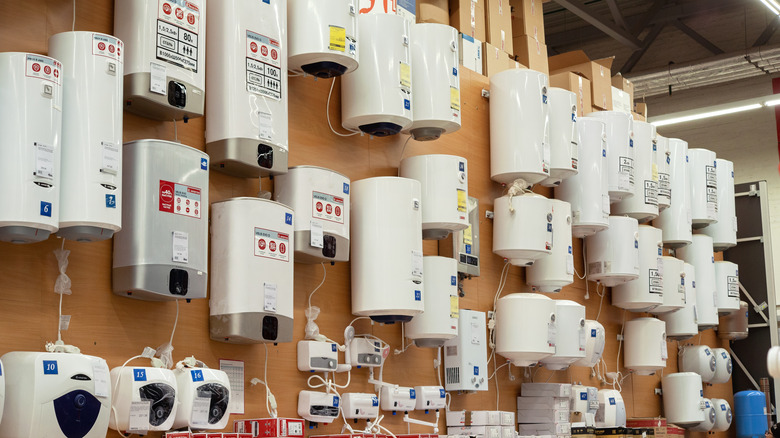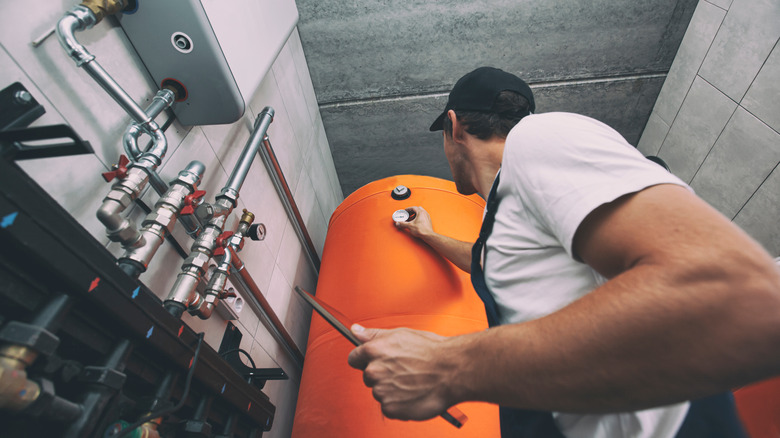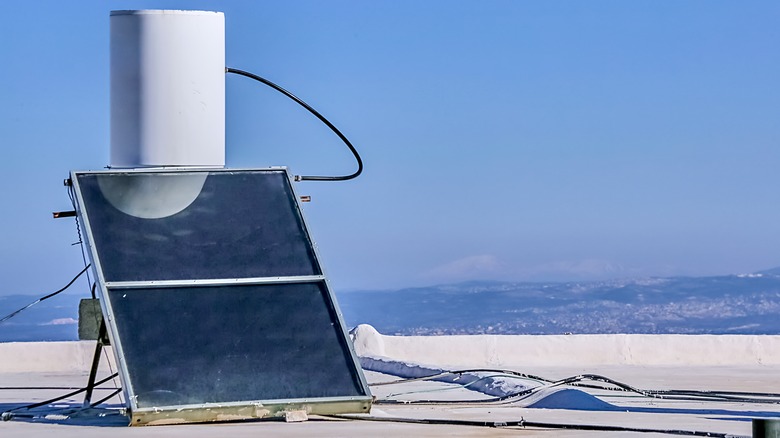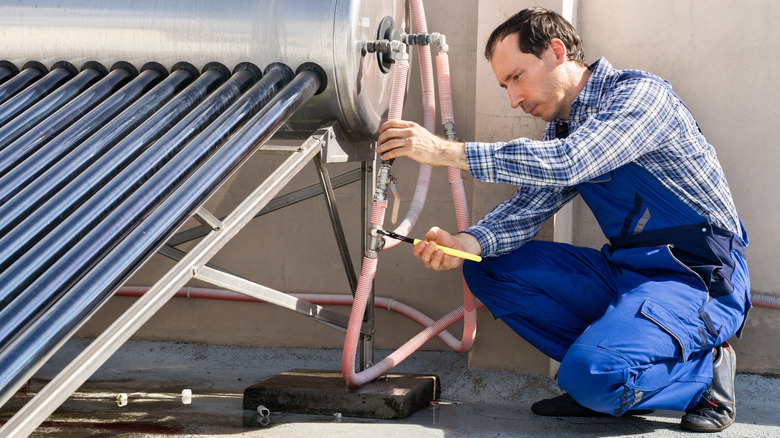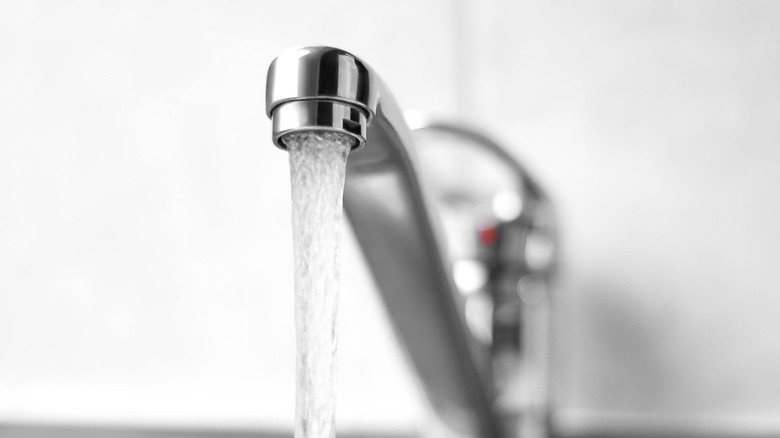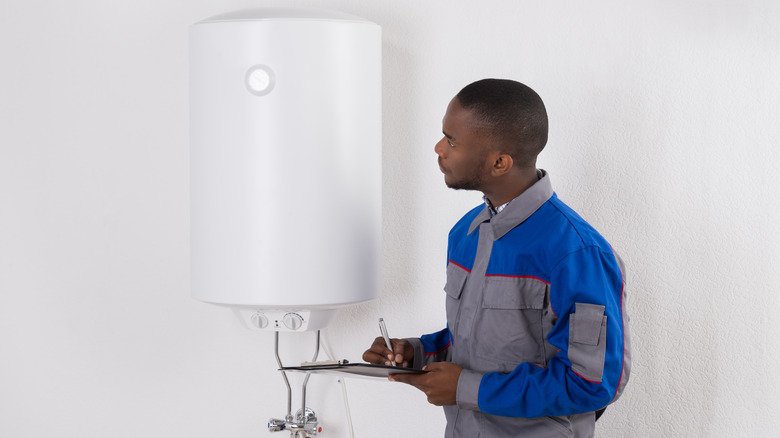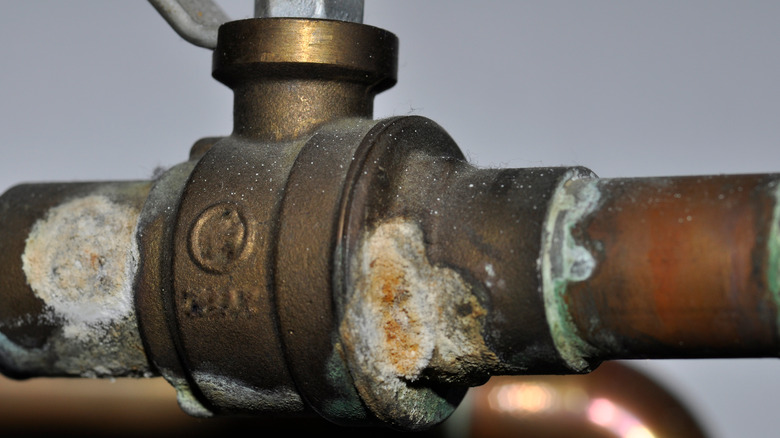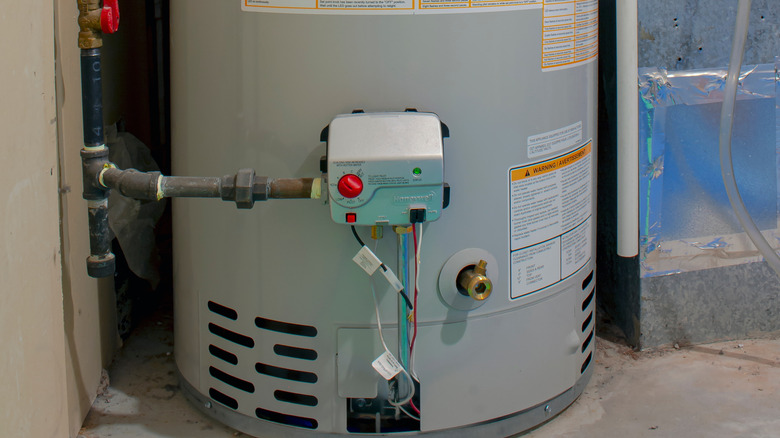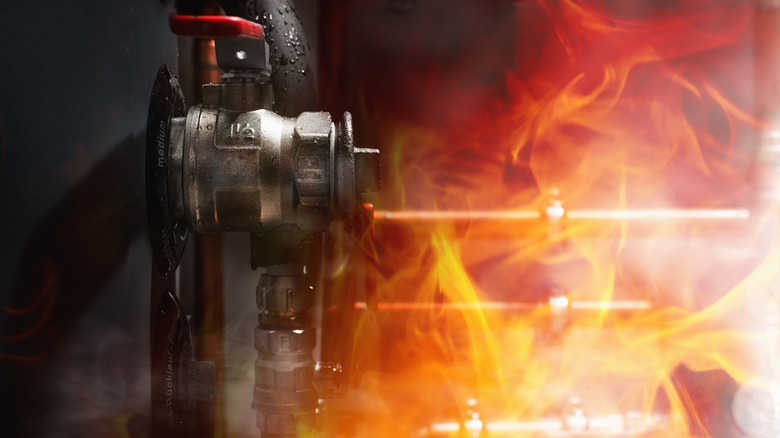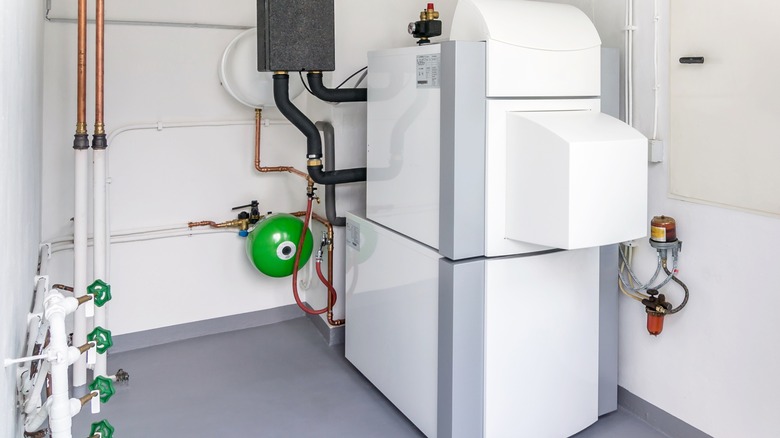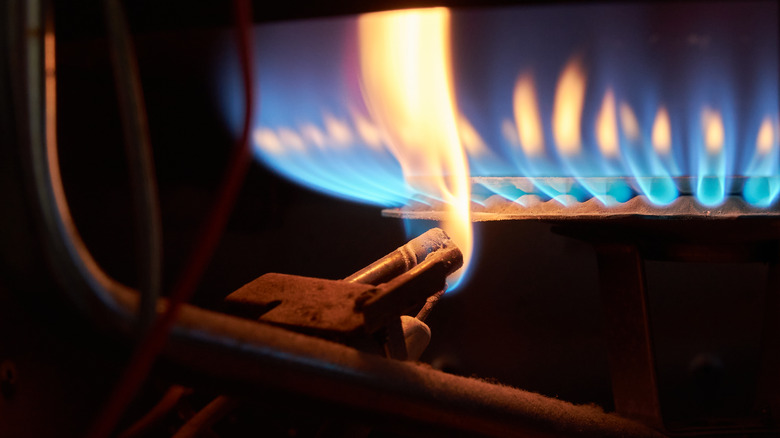Mistakes Everyone Makes When Buying A Water Heater
Figuring out which water heater is right for you can be a daunting process. Weighing cost against quality, especially with inflation affecting prices, can be challenging. Deciding on your water heater's size, type, and fuel type doesn't have to be hard, though. Knowing your peak demand for hot water on an average day can help you make the right decision.
Richard Tretheway, a plumbing and heating expert from This Old House, says, "Size a water heater for your demand 363 days a year, not the one or two days that you've got 25 relatives visiting. Otherwise, you'll end up with an energy-gobbling beast in the basement." This and many other common mistakes can cost you when choosing your new hot water heater. Knowing your way around sizes, fuel type, configuration, and climate and insulation concerns can make a world of difference when choosing the right water heater, so here are some mistakes to avoid when making your selection.
Not thinking long term
One big mistake people make when buying a water heater is thinking only short-term about savings. Energy usage is a big component of choosing a water heater because reducing energy use will save you money. According to Energy Saver, water heaters available in the U.S. range in size and type of power they use, and choosing the right one can make a big difference in long-term costs. The type of energy you have available to you is one constraint, but others can include local ordinances as well.
According to Nearby Engineers, in New York City, the annual cost of a heat pump water heater is $1,808, a tankless electric water heater is $4,426, a gas-powered tankless water heater is $1,300, and a gas powered conventional water heater is $1,865. The initial price of installing a gas-powered tankless system is higher than other water heaters, but the long-term advantage can save you money. It's important to remember that the cost of electricity in New York City is relatively high, and that the price of gas in other areas might be higher. Hence, comparing fuel prices in your area is the best way to ensure you're making the right long-term choice. Thinking long-term about the costs of the different types of water heaters means that you can save money not just on your initial installation costs but also on energy and water use over time.
Not looking at all the options
Water heaters are more than just giant tanks in your basement. There are many advancements in heating methods that can save you money. According to Ygrene, the types of water heaters in the U.S. are: conventional, tankless, heat pump, solar, and condensing. Conventional water heaters use more energy than other types because they constantly heat a supply of water. In contrast, on-demand type systems like tankless water heaters heat water on an as-needed basis.
While heat pump water heaters tend to be the most efficient, they require lots of space and can only be operated in temperatures between 40 and 90 degrees. Solar hot water systems operate on sunlight, so unless you live in a mostly sunny climate, you'll be relying on your regular electric service the rest of the time. While condensing models are more efficient than traditional water heaters, they can be expensive to install and require a lot of space. Knowing your spatial constraints, zoning ordinances, and energy constraints will help you make a well-informed decision about what kind of water heater to purchase.
Not taking conversion costs into account
Switching from one hot water heater type to another can bring unexpected costs. Calculating the conversion costs before making decisions can save you money in installation fees. While a gas-powered tankless on-demand condensing water heater is the most efficient on average, conversion can run you in excess of $3,000, according to HomeGuide.
Adding venting, bringing plumbing up to code, and modifying your gas line are all factors to consider. Also, if you need to have a new gas line run to your house, change the location of your water heater, or apply for permits, all of these things can cost more in labor and materials. While a tankless system will last five to 10 years longer than other water heater types, doing the math to make sure your conversion is worth the price will help you make a better investment.
Not taking the environment into consideration
The climate where you and your water heater are located makes a difference in water temperature and efficiency. For instance, solar-powered water heaters are very efficient when they get enough sun, but if you live in an area with less sunshine, these systems will need a back-up power source to run, as per Homenish. Because they have storage tanks, they keep a supply of water heated all the time, meaning that if you're using your home's electricity as a back-up, you're paying the same during that time as you would for a conventional hot water heater.
Areas where temperatures get cold will also need to factor in insulation costs. In addition to weather and temperature, the minerals in your water supply can affect the life of your water heater. Calcium build-up and scale can cause deterioration in your water tank, and even sometimes in your tankless system. Regular maintenance is important to protect your hot water system and avoid these environmental factors.
Not factoring in labor to the cost of replacement
Usually, buying a water heater includes installation, but this can come with more costs. HomeAdvisor states that the typical price range for installing a new water heater is between $830 and $1,600. But this range is a loose average, and costs could be upwards of $4,000 depending on the labor needed for your installation. The typical rate for a plumber is between $45 and $150 per hour, so installation costs could go up depending on how long it takes to install your water heater.
You'll also need an electrician for some systems, which is a separate bill for labor. Bob Vila warns that the cost of labor when removing your old water heater and when reconfiguring plumbing can affect the overall price of your unit as well. The trick to not stumbling into surprise costs is to research the various types of water heaters before you buy, and ask your installer upfront for an estimate before choosing a system.
Not factoring in water usage
The amount of water you need to use affects the size of the water heater. Conventional water heaters can range in size from about 30 to 80 gallons, and Home Inspection Insider recommends calculating that each person in your household represents about 10 to 15 gallons of water usage. However, some water heaters recover faster, so they can heat more water more quickly. For example, an electric water heater that serves a family of five would need an 80-gallon tank, but you only need a 50-gallon tank for a gas-powered unit.
For tankless water heaters, you need to measure the flow rate of the water going through your household and factor in the rate of temperature increase that your water heater can handle. Running a washing machine will use two gallons per minute (GPM), while your average faucet uses 1.5 GPM. To calculate the temperature needed, subtract the temperature of the water coming into your house, which is 50 degrees on average, from the desired temperature of your hot water, which is usually about 100 to 120 degrees. If you want to use the washer and faucet simultaneously, you need a tankless water heater that can produce water at 50 to 70 degrees at a rate of 3.5 GPM. The more efficient your appliances are, the less flow your water heater will need to keep up with.
Not taking maintenance into consideration
Regular maintenance is required with most water heater systems. With a conventional storage tank unit, flushing the tank to get rid of mineral build-up or scale can significantly increase your unit's lifespan, according to Sensible Digs. Other maintenance issues can stem from frozen pipes, corroded anode rods inside the tank, and problems with valves. An annual check should be done to make any repairs necessary to keep your water heater functioning correctly.
For a tankless water heater system, Mr. Rooter recommends regular cleaning and descaling to avoid limescale buildup. If you plan on doing this maintenance yourself, you will need some supplies, including a submersible pump and hoses, a bucket, and undiluted white vinegar. Most systems need this maintenance once per year, but you might need to do so more frequently if you have hard water. Taking on the maintenance of your water heater is one consideration when choosing your model.
Not taking lifespan and durability into account
Some water heaters can last longer than others. According to the International Association of Certified Home Inspectors, factors that can affect the lifespan of a water heater are the minerals in your municipal water supply, the volume of hot water that runs through the system, and the correct installation of the unit. The basic rule of thumb is to determine if the parts required to fix your existing water heater amount to more than 10% of the cost of buying a new one. If they do, it's time to replace your unit. Taking this into account can help you figure out how much money your unit will ultimately cost over time.
The average lifespan of a tankless on-demand water heater is twice that of an average conventional model, according to Energy Saver. This can amount to savings on replacement and maintenance costs in the long run, so taking lifespan into account is a good idea when choosing the type of water heater to buy.
Not factoring in insulation
Extra insulation might be the answer if your water heater is losing heat quickly during the colder season. Rather than replacing it right away, a water heater blanket is a low-cost alternative. Doing your own insulation can be a simple project, according to Energy Saver. A water heater blanket can provide an extra layer of insulation during winter if your water heater is located in a colder area of your home, like a basement or attic.
You can check with your local utility company or municipality to see if they offer low-cost water heater blankets or rebates. You might find that this is a savings-upon-savings DIY where you can get very low-cost insulation that will pay for itself in a few months. Note that this type of insulation is only helpful for conventional storage-tank water heaters, as tankless models don't have a tank to insulate.
Thinking that installing a new water heater is a DIY job
Water heaters aren't for DIYers unless you have some experience. While you might want to save some money by skipping the plumber, this can cause expensive problems down the road. Angi warns that some common mistakes can result in gas leaks, carbon monoxide poisoning from improper venting, fire from gas leaks, or improperly installed wiring. Water leaks can also damage your home, costing a bundle to fix. If your water heater is installed improperly, it might be difficult or impossible to do regular maintenance.
You could also find yourself on the wrong side of local building codes, or without the correct permits for your job. If any of these pitfalls occur, your homeowner's insurance and warranty won't cover a botched, unlicensed DIY job. While there are tutorials that explain how to install a hot water heater, the systems involved require a degree of experience and are best left to professionals.
Waiting until your old one fails to buy a new one
If your hot water heater dies on you, it can be very inconvenient or, in some cases, can even cause flooding. It is a good investment to replace it if it's more than 10 years old, especially when it starts to show signs of wear like making noise. Bob Vila makes the case for replacing your hot water heater before a disaster. In addition to avoiding the damage a flood can cause, thinking through a decision on a replacement will be far less stressful without the need to hurry.
If you wait until your unit is beyond repair, you'll likely be without hot water for several days, or you'll need to pay through the nose for an emergency plumber. In addition to avoiding disaster, updating your water heater to a newer, more efficient model will save you money on your energy bill, so choosing to replace a water heater that's past its prime is a good bet.
Not taking resale value into account
A high-efficiency water heater can add value to your home and increase the resale price. According to Effective Agents, the number one improvement you can do to improve your home's resale value is installing a tankless on-demand water heater. Not only is it an environmentally sustainable improvement, but it can also make your home more attractive to future buyers who want to save on future utility bills. The extra space can also be a draw, sometimes adding an extra closet where the big water tank used to be.
While it may take quite some time to recoup the costs of converting a conventional water heater to a tankless one, the rewards could be shorter-term if you plan to sell your home. Homes with a tankless water heater system bring in 4% more on average and sell 43 days sooner, says Better Housekeeper. That makes tankless hot water heaters a major advantage when you want to sell your home.
Not taking the energy type into consideration
While some people have gas lines already running to their house, some people would need to add those in order to reap the benefits of certain types of efficient water heaters. While both gas and electric have their advantages, they also have their downsides, as per Forbes. While electric powered water heaters tend to be cheaper on point of purchase, gas heaters tend to be cheaper to run. Electric hot water systems tend to be less efficient, while gas hot water systems have a slightly higher safety risk.
Choosing to switch from one to the other will incur conversion costs like updating your gas line or installing the appropriate electrical connections. If you're planning to use a heat pump with a backup that taps into your home utilities, choosing the correct configuration to get the most out of your system is important. Ensure you know which type of power you're using before you fall in love with a water heater that isn't compatible with your current system, or plan on extra conversion costs.
Not doing your research before you buy
Hot water heaters are a big purchase. Spending some time looking at all of your options before choosing one is a good idea. Consumer Reports has gathered helpful data on the different types of water heaters, their costs, and life expectancy. They point out that looking into the warranty of the system you intend to install is important. If your water heater fails after the warranty is expired, the cost to repair or replace it will be significantly higher.
Water heater tests are conducted under what is considered heavy use circumstances, meaning that the units are put to their maximum capacity to check their performance. Most households with less than six people won't go through more than 80 gallons of water in a day, but testing the performance of water heaters at their limits gives you a better idea of how they will run from day to day. Comparing efficiency, durability, and maintenance costs will mean making the best long-term decision on a water heater.
